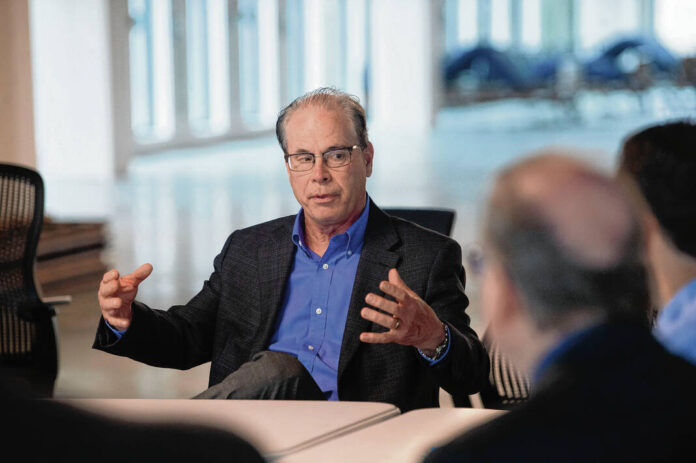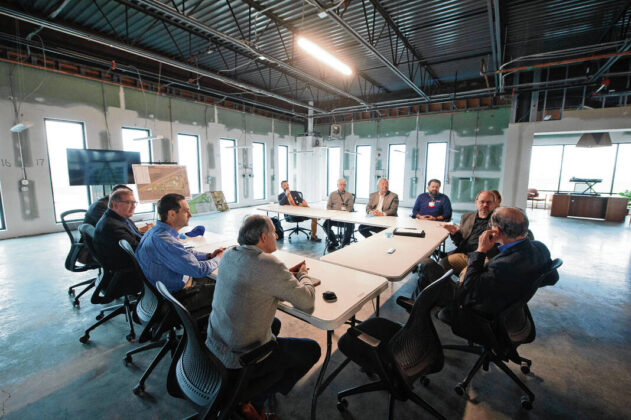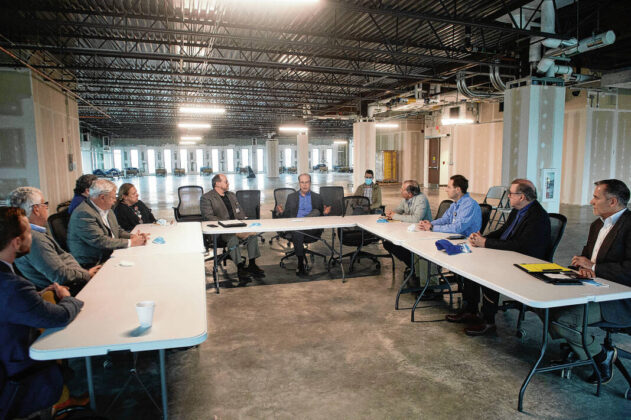
Sen. Mike Braun speaks to a group of doctors and administrators during a recent visit to Hancock Regional Hospital’s Gateway location. Wednesday, April 13, 2022.
Tom Russo | Daily Reporter
HANCOCK COUNTY — Sen. Mike Braun, R-Indiana, sat at a table with local hospital officials on the top floor of Hancock Health Gateway near Mt. Comfort. Below them worked health care professionals in the fields of imaging, labs and immediate care.
It may have seemed contradictory at first glance, as the lawmaker and health leaders were discussing ways to keep people out of the health care system — the parts of it that are avoidable, that is.
That topic, along with bringing health care closer to employers and their employees without insurance companies, made up much of the discussion during Braun’s visit to Hancock County earlier this week.
The stop was part of Braun’s election pledge to visit all 92 counties every year, one he said he’s kept the first three years of his term since taking office in the U.S. Senate in 2019.
“This medical center is an innovator,” Braun said after the discussion Wednesday. “They’re doing what I’ve preached for a long time — avoid the health care system by how you manage your well-being.”
Braun recalled creating an insurance plan at his own company 15 years ago and incentivizing his employees to take care of themselves and dodge preventable health care procedures.
“They’re taking that same point of view,” he said of Hancock Health. “Part of a hospital system that’s actually emphasizing wellness and prevention, which would be counter to what many hospitals would be about. It’s the highest cost out there of any sector of our economy, and Indiana supports some of the highest hospital costs in the nation. That affects every Hoosier, and it’s been the issue I’ve been most interested in as a business owner and a senator.”
Steve Long, president and CEO of Hancock Health, said he respects Braun’s perspective as a business owner toward the health care provider’s strategy to cut out insurance companies.
“The thing that we see is that with the insurance companies in the middle, it creates a barrier between the health care system and the employees and employers,” Long said, adding that barrier also creates significant costs. “So what we want to say is how do we work directly with an employer to create a strategy whereby we can lower their cost of care, lower the cost that the employee pays out of pocket, and ensure that those employees utilize us so that we can partner with them.”
Long said he also appreciates that Braun values independent local hospitals like Hancock Regional.
“Those are becoming few and far between,” Long said. “We want to remain independent — these are the kinds of things that we need to do to do that — and yet the broader issues that really come from the big insurance companies and the big health systems — we get caught — and it becomes ever more difficult to remain independent.”
Braun said visits like the one to Gateway help inform his work in Washington, D.C.
“It helps me to look at what I might be able to do through the labyrinth of federal legislation,” he said, noting that his office was tied for the most bills passed in 2021. “You’d think that’d be a huge number — double digits — well, it was three. That’s how hard it is. We take this kind of feedback and try to turn it into practical legislation that gets broad support on both sides of the aisle, not try to change the whole system — that gets too much into the Hatfields and McCoys and it never gets much done.”
Such visits are similarly helpful for Hancock Health, Long said.
“It gives us a peek behind the curtain that says here is what folks that are our elected representatives are thinking,” he said. “And it allows us to help them see it from our perspective, and then we get perspectives from others that we don’t talk to that also talk to people like Sen. Braun.”








